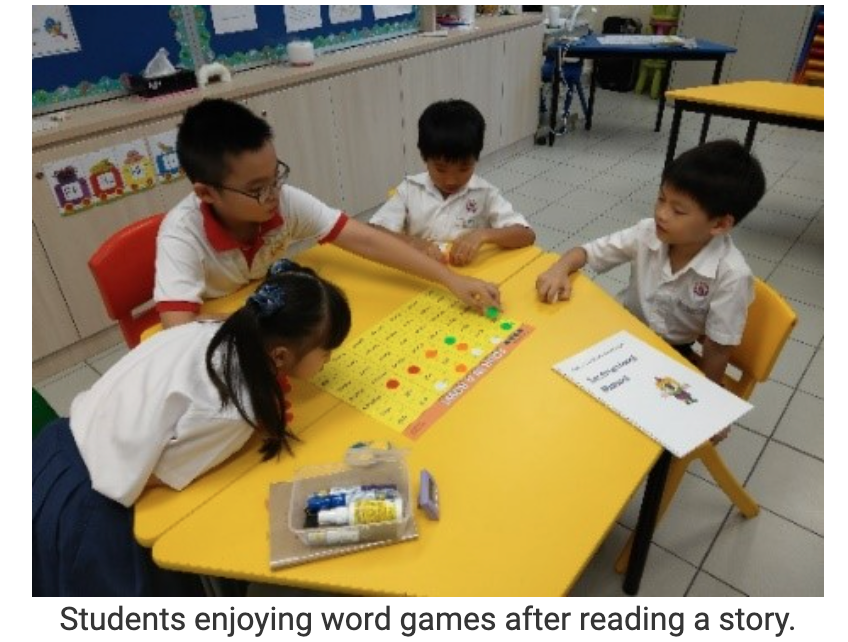英文 English
Our Objectives
At RSS, we aim to nurture confident and effective communicators as well as critical thinkers who are able to use the English Language to deepen their insights, connect with others effectively and contribute to the community.
Our Key Programmes/Activities
Oracy Programmes
Effective Communication Programme (ECP)
Our students hone their communication skills on a variety of platforms. Through the different level activities, they learn to communicate confidently and effectively with a range of audience. They also learn to work collaboratively with their peers and use feedback provided by their teachers and peers to improve on their presentation.
Primary 1: Show and Tell
The P1 students are guided to prepare a speech on a given topic within their knowledge and experience and present it to their teachers and classmates. This activity not only enables students to hone their public speaking and basic writing skills, but it also provides a meaningful platform for teachers and students to bond as they get to know one another better.
Primary 2: Pick and Tell
This activity extends the learning gleaned by the students when they were in P1. The P2 students pick an item from a collection before they are guided to prepare and present a speech in relation to the chosen item. Through this activity, the students learn to generate ideas creatively and they continue to hone their public speaking and writing skills.
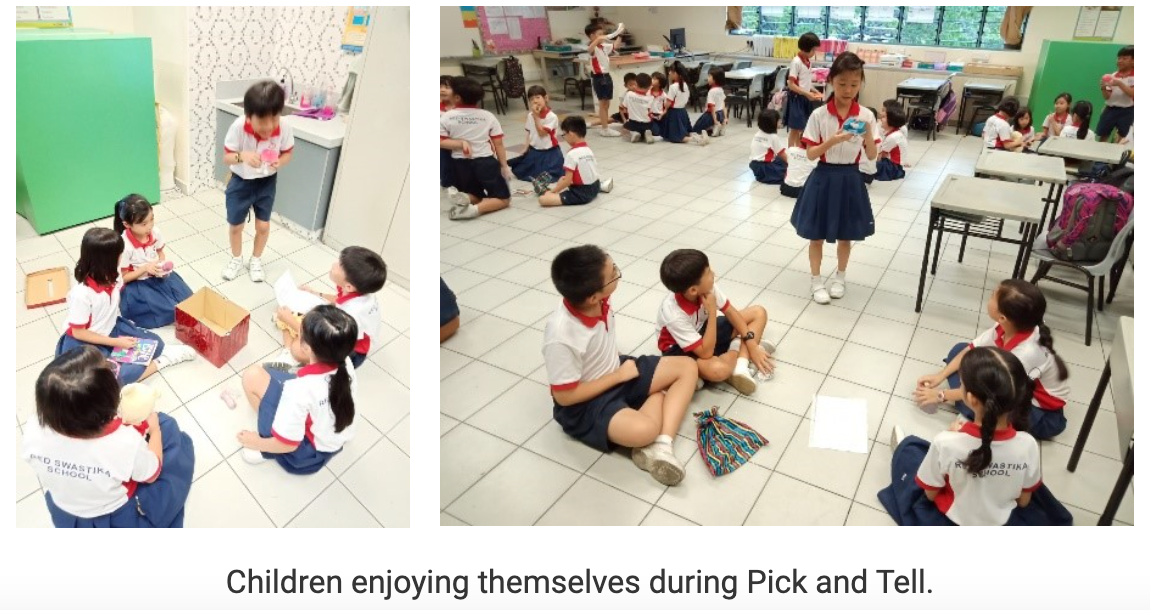
Primary 3 & Primary 4: Readers’ Theatre
The P3 & P4 students perform a Readers’ Theatre for their teachers and classmates based on a script of their choice. They work collaboratively as a team to “act out” the different roles in a story by reading in an expressive manner, using effective vocal cues. Through this activity, the students learn effective dramatization skills and continue to build their confidence in engaging an audience.
Primary 5: Debate
Using debates in the classroom provide students the opportunity to work in a collaborative and cooperative group setting. The students get the opportunity to discuss and organize their points of view for one side of an argument as they discover new information and put knowledge into action. Classroom debates also help students learn through friendly competition, examine controversial topics as well as strengthen their skills in the areas of leadership, communication, problem solving and presentation.
Primary 6: Podcast
Our P6 students will find that producing a podcast is a great way for them to develop their oral and creative writing skills. As they plan and structure their podcast, write and edit their scripts as well as record and edit their audio, the students will be able to express their ideas in a unique and creative way which is also a favourable avenue with the current times.
Writing Programmes
Use of Mentor Texts
We adopt the ‘I Do-We Do-You Do’ model in teaching writing. In Primary 3 and 4, students read and emulate mentor texts that serve as models of good writing.
I Do:
Based on the learning focus of a lesson, the teacher introduces a mentor text to teach ideas, structures and/or specific writing skills.
We Do:
Guided practices are designed for students to test drive and apply what they have learnt from a mentor text. The activities are conducted in pairs or in a group to encourage collaborative learning.
You Do:
Students are engaged in independent writing where they apply what they have learnt to their own writing.
Process Writing
From Primary 3 to Primary 6, the students are engaged in process writing where each writing task is broken down into its smaller components. The students are guided to complete each component sequentially, and this helps make writing a more enjoyable task for many students. The students also learn that writing has to be planned, and it will evolve as it develops and takes shape. Process Writing consists of two major and interdependent phases: the prewriting phase and the writing phase. Prewriting helps writers to organize, sequence, and elaborate on their ideas prior to writing. The writing phase turns this organisation of ideas into a composition.

> Reading Programmes
EL/CL Reading Programme
In collaboration with the CL department, My Book Recommendations, a booklet consisting of activities to promote reading, is given to each student. The booklets are customised for each level to cater to the needs of different reading ages. Both teachers and students are engaged in the activities, thus encouraging everyone @RSS to read widely. An example of an activity in the booklet is the Reading Bingo where students are engaged in various ways to pique their interest in EL and CL books.
Visits to RSS Library
Students are taken to the school library regularly where they are introduced to the different genres available. Through various library programmes, in-house or in collaboration with the National Library Board, the students are engaged in different activities that deepen their reading interest. Thematic book displays are also put up regularly to introduce students to the wide variety of good books in the library.
In-curriculum Reading Programme
This programme, as a part of the STELLAR Programme (as shown under MOE Programmes), aims to inculcate the love for reading in children. Comprising the Shared Book Approach in Primary 1 and Primary 2 and Supported Reading in Primary 3 to Primary 6, the programme is carried out regularly in class. In addition, there is also the Extensive Reading Programme where ‘book floods’ are made available in all EL classrooms – students borrow books from a flood (a huge supply) of books and get to read new books when their classes’ books are exchanged with others’.
Through the above activities, RSS students discover the joy of reading and open themselves up to a world beyond their imagination.
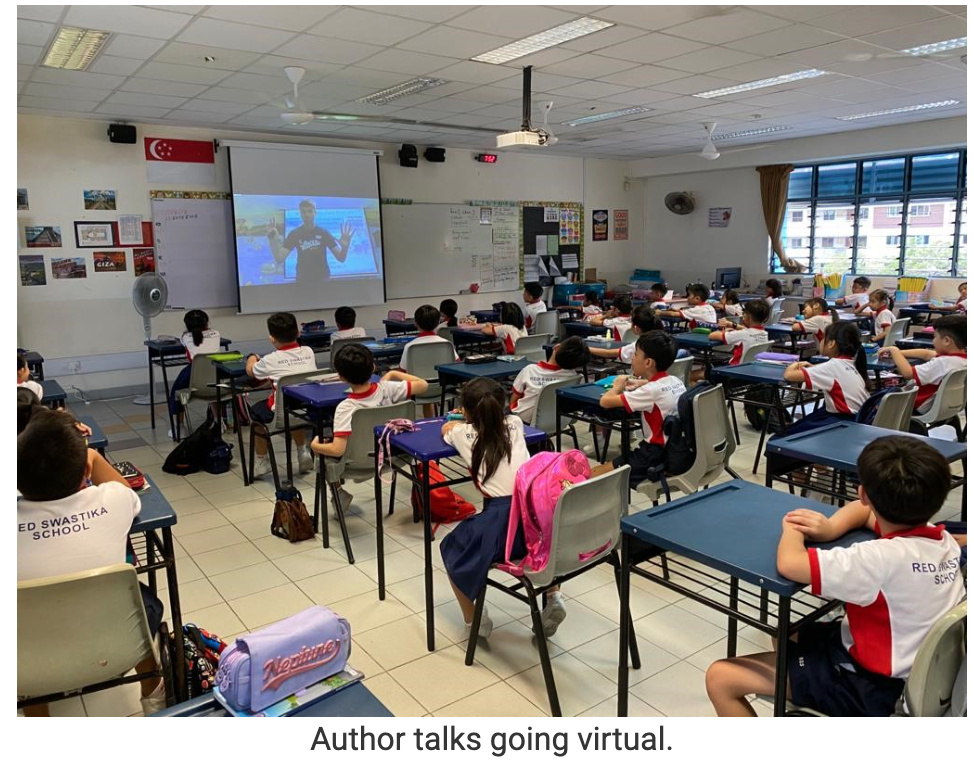
RSS Reads!
RSS Reads! is a termly event organized by both the English and Chinese
Language departments with the main objective of deepening the students’
love in reading. Every term, the students will be presented with a different
theme – a way in which the joy in reading can be cultivated and translated
into actions. We look forward to seeing how our students can materialise
their love for reading through the different termly themes.
Term 1:
The theme for term 1 was ‘Superheroes’. Staff and students came dressed
as their favourite hero from a book/real-life event that inspired them.
Some also brought along a prop that represented their chosen hero. The
students also brough the book related to their chosen hero as they were
given the opportunity to read about it in class and share their ‘hero’
stories with their peers and teachers.
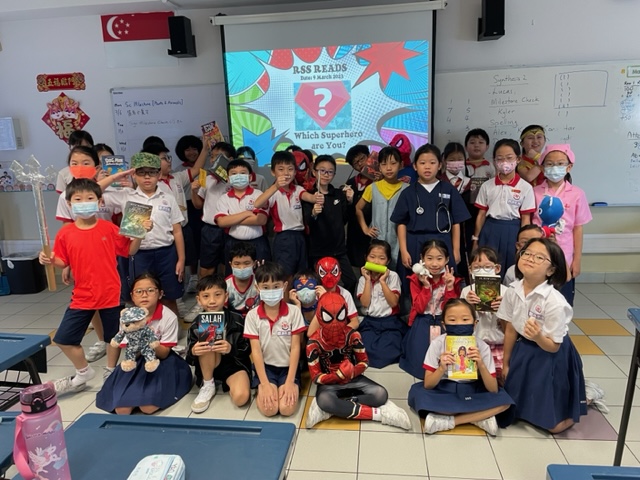
Look out for the other RSS Reads! activities in the coming terms.
> MOE Programmes
STELLAR Programme
STELLAR (Strategies for English Language Learning and Reading) aims to foster a love for reading and a strong foundation in the receptive and productive skills. The STELLAR programme is built on the belief that enjoyment is a fundamental aspect of all positive reading and writing experiences.
The Lower Primary STELLAR comprises of the following strategies:
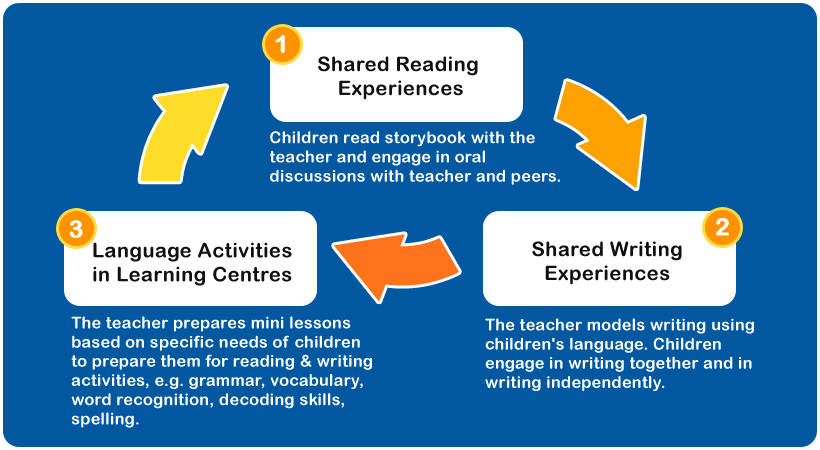
The Upper Primary STELLAR comprises of the following strategies:
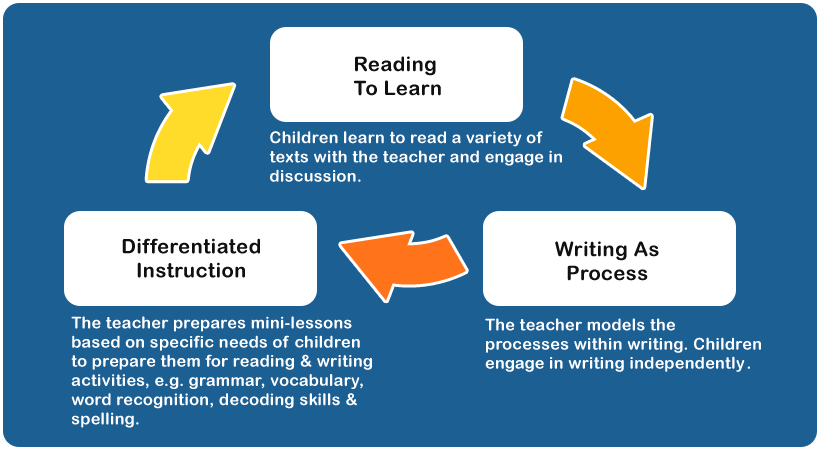
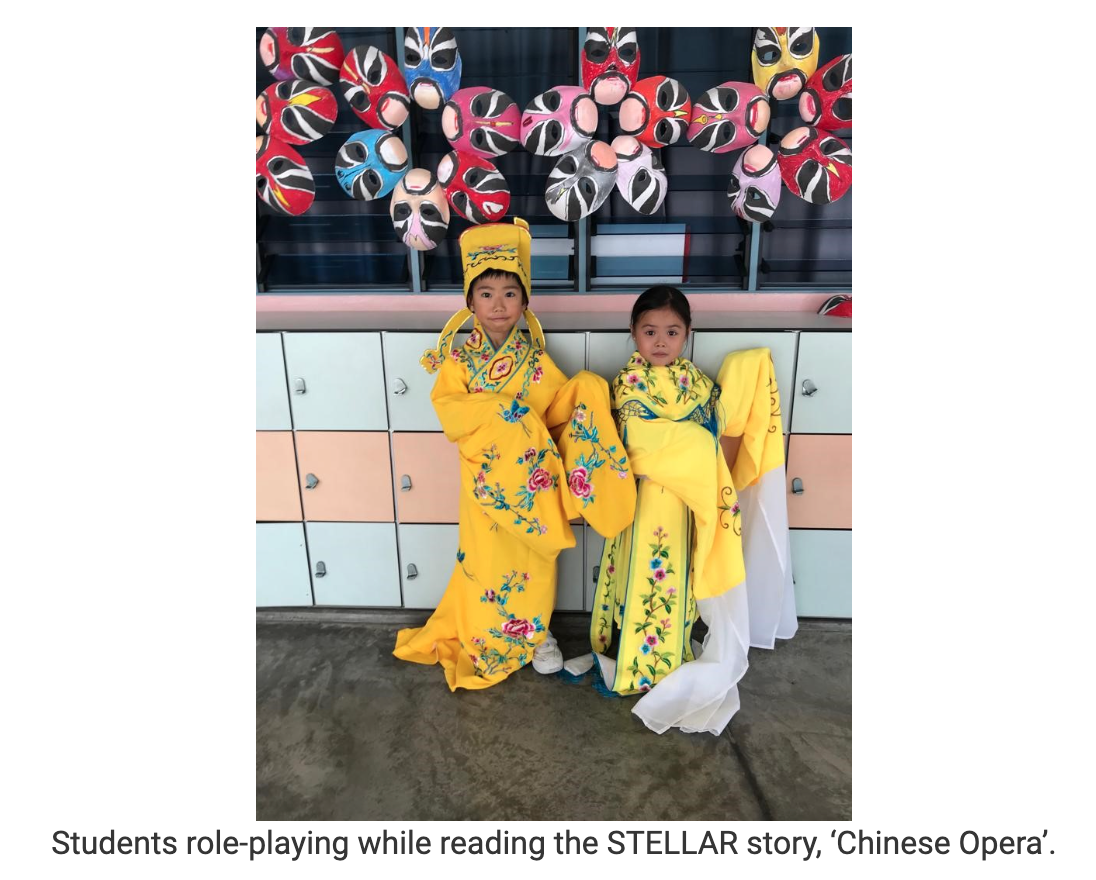
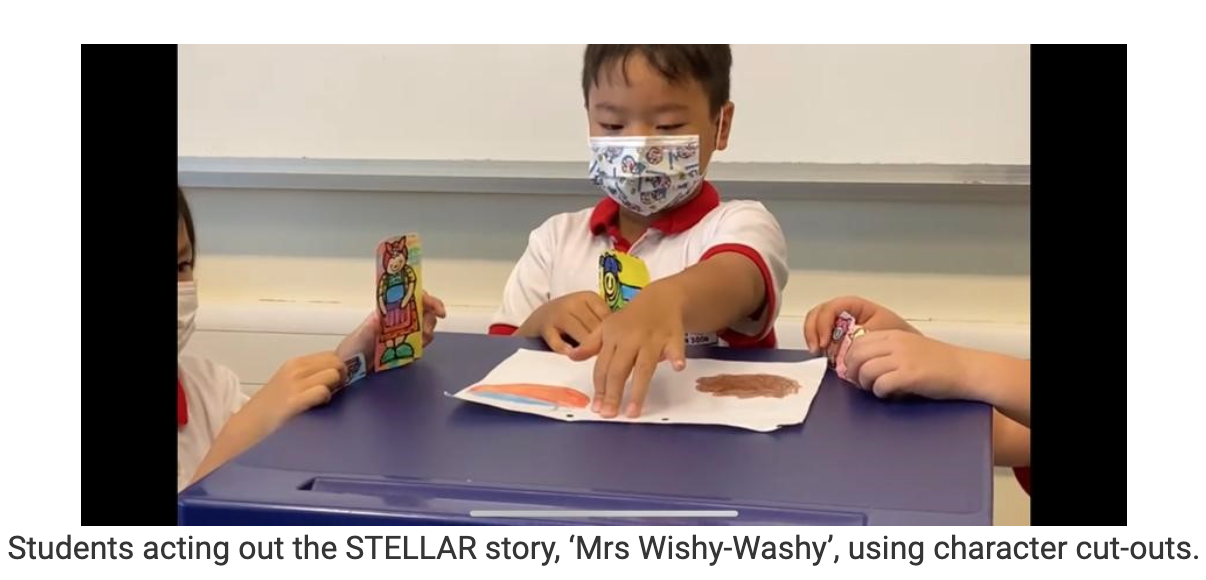
Learning Support Programme (LSP), Reading Remediation Programme (RRP) and School-based Dyslexia Remediation (SDR)
The LSP (Primary 1 & Primary 2), RRP (Primary 3 & Primary 4) and SDR (Primary 3 & Primary 4) are literacy support programmes that cater to the needs of struggling readers. The lessons are conducted by trained Learning Support Coordinators (LSC), RRP and SDR teacher-instructors who provide remediation in reading, using comprehensive teaching packages developed by the Reading Unit of EL Curriculum Planning and Development Division.
